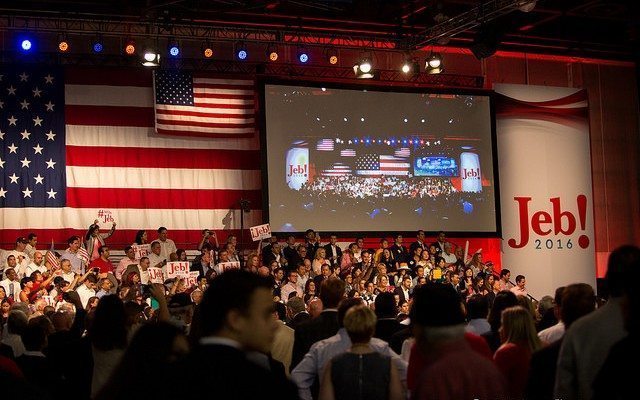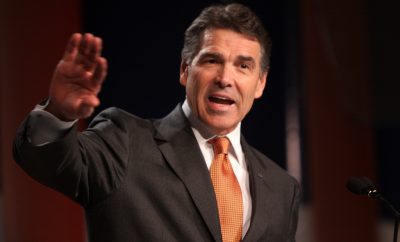 Image courtesy of [Yashmori via Flickr]
Image courtesy of [Yashmori via Flickr]
Elections
Four Ways Jeb Bush Is Setting Himself Apart From the Republican Competition
Former Governor Jeb Bush has a notorious reputation that stems from years prior to his intentions of running for president. There’s his grandfather, Prescott Bush, a U.S. senator who allegedly collaborated with Nazis during WWII; his father, President George H.W. Bush, who was accused of formerly working with Osama Bin Laden; and his own brother, President George W. Bush, who is blamed for the War on Terror that cost our nation up to $1.7 trillion dollars. So in order to run a successful campaign, Jeb Bush will need a lot more than money and his last name. In fact, those very things might be putting him at a disadvantage, and motivating his strategically designed campaign to avoid his inheritance. Here are four of the most recent instances that show Jeb Bush’s very cleverly marketed campaign strategy:
Distancing Himself from the Bush Name
Despite years of a political presence, it seems that Jeb Bush is trying to distance himself from the “political dynasty” the Bushes are linked to. On Monday June 15, Bush formally declared that he was running for president of the United States. His announcement was accompanied by signs which read “Jeb!” but there were no mentions of his last name anywhere. Insisting that his family name gave him no unique claim to the Oval Office, Bush explained that he is not entitled to the position but rather wants voters to view him as an executive animated by big ideas and uniquely capable of carrying them out. He made reference to his record in Florida of expanding charter schools, introducing a taxpayer-financed school voucher program, reducing the size of the state government by thousands of workers, and cutting taxes by billions. Bush further added to his individualistic approach toward the candidacy by saying: “Not one of us deserves the job by right of resume party, seniority, family or family narrative… It’s nobody’s turn. It’s everybody’s test.”
A Liberal Approach to Immigration
Unlike his brother, father, and most Republicans, Bush has a very large Hispanic following. It’s true he has family connections–his wife Columba is Mexican–but his stance on immigration is a larger contributor to this following. Bush takes a relatively liberal approach toward the way future America ought to handle the immigration issue. Bush has been cited as “empathetic” toward illegal immigrants, and has referred to their actions as an “act of love” rather than a crime. In his book “Immigration Wars,” Bush actually makes the claim that immigrants are vital to the United States, and that we are not bringing in enough highly skilled immigrants to meet our needs and to maximize future American prosperity. Although highly controversial in the conservative community, Bush has stood by this position. Furthermore, Bush is a strong advocate for granting illegal immigrants a pathway to a legalized status rather than sending them back over the border. So it’s no surprise that Bush has secured relatively strong Hispanic support.
Six Months of Informal Campaigning
Bush clearly understands the campaign steps he must follow in order to win. Despite his prolonged decision and extended time–almost six months–of unofficial “campaigning” Bush now has a clear idea of what he must do to make this race exciting. Rather than quickly appearing in the spotlight like his Republican competitors Texas Senator Ted Cruz, Florida Senator Marco Rubio, and Kentucky Senator Rand Paul, Bush took the strategic approach of what could be called hypothetical campaigning. His unofficial campaigning not only permitted him more time to travel to different towns and listen to individuals requests, it allowed him to spend more money on his unofficial campaign than his competition. What many deemed as “illegal campaigning,” is actually entirely legal given that he technically was not an official candidate for the presidency until Monday. Bush was strategic about his approach to the campaign, seemingly knowing that his Super PAC, Right to Rise, was legally allowed to continue raising money without becoming subject to campaign finance laws so long as Bush did not officially acknowledge himself as a candidate. Super PACs are not subject to donation limits, while candidates can only accept $2,700 per donor per election. Had Bush decided to declare his candidacy six months ago when he started his hypothetical campaign efforts, any Super PAC bearing his name would have been limited to accepting less. Critics have argued that Bush’s tactics were illegal, however the various rules in place indicate that’s probably not the case.
His Venue Choice and Spanish Skills
Of all places to announce his presidential campaign, Bush chose the Miami Dade College campus. MDC is comprised of a large community of Hispanic students and workers. Bush reportedly gave parts of his speech in Spanish, proving his fluency in the language and further appealing to minority voters–something not seen from his Republican competition. It’s no surprise that the Hispanic showing at Monday’s event was paramount. Many of the official campaign signs seen in the crowd portrayed an upside down exclamation mark preceding the letter J in Jeb (a grammar reference in the Spanish language) which is once again a very strong indication of just how much Hispanic support was concentrated inside the mid-sized auditorium on Monday evening.
Whether Jeb is the ideal candidate for the presidency or not is yet to be seen. However one thing is certain–Jeb is a political genius when it comes to campaigning. Whether it be distancing himself from the family name, addressing the immigration issue in a positive manner, or even the smaller things such as his campaign choice and location preference, Jeb Bush is carefully planning an elaborate campaign which will make for a very interesting race.








Comments